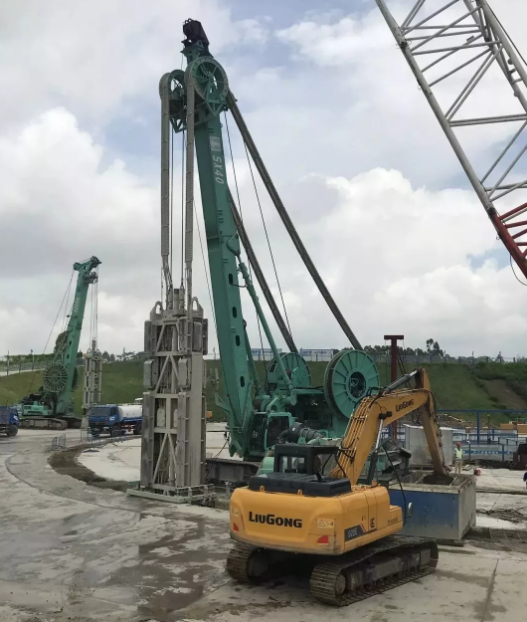LiuGong News
The Pingnan Third Bridge of Xunjiang River is on the North-South interchange line of Lipu-Yulin Expressway in Guangxi, China. The main span of the bridge reaches 575 meters which would be longest span arch bridge in the world after completion. The main bridge’s diaphragm wall construction work is undertaken by X40 double-wheel milling and SG600 diaphragm wall grab, both manufactured by Shanghai Jintai Company, a LiuGong Foundation Equipment Company, and assisted by a LiuGong 922E excavator.

The bridge is located in terraced land of an alluvial river with extremely complex geology landforms, which required high standard in both machinery and technology. As a result, the construction of diaphragm wall groove is used a combination in technology of gripping & milling. In the 1st stage, the SG60 grab is used in the upper part to make a groove while the SX40 milling machine is used in the lower part to complete the groove. In the 2nd stage, all the grooves will be milled by the SX40.
Both SX40 double-wheel milling machines and SG60 diaphragm wall grab are the foundation construction equipment independently developed by Shanghai Jintai Construction Machinery Co., Ltd. The SX40 uses both diesel oil and electric power and its slag discharge is accomplished through the large diameter pipeline using gas discharge and reverse circulation, which is more economical and applicable than the pumping slag discharge method which is normally used worldwide. The machine is also more adapt to complex geological conditions such as large-size gravel stratum and hard rock stratum. The application of both milling and grabbing machines has become a common solution for complicated geological conditions in China.
Recently, a delegation of the managers from the project contractor, the construction company and Jintai visited the construction site. The project manager of the construction unit, Mr. Li praised Jintai’s SX40 double-wheel milling machine of its stability as well as the great efficiency. “The machine has strongly contributed to our progress. Since the project’s start-up in early May, the equipment has been running for nearly 1600 hours, without any breakdowns, and has completed 80% of the work so far. We are also pleased to see, despite the running time demands, the maintenance cost is quite low. We are glad that we made a good choice!”